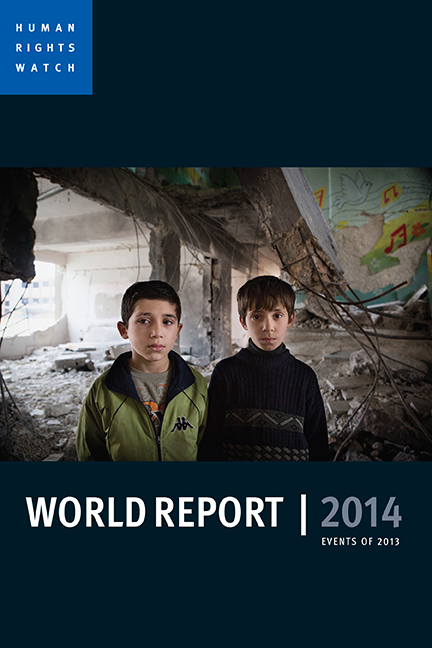Book contents
- Frontmatter
- Dedication
- HUMAN RIGHTS WATCH
- Table of Contents
- Foreword
- Rights Struggles of 2013: Stopping Mass Atrocities, Majority Bullying, and Abusive Counterterrorism
- The Human Rights Case for Drug Reform How Drug Criminalization Destroys Lives, Feeds Abuses, and Subverts the Rule of Law
- Putting Development to Rights: Integrating Rights into a Post-2015 Agenda
- The Right Whose Time Has Come (Again) Privacy in the Age of Surveillance
- Photo Essays
- AFRICA
- AMERICAS
- ASIA
- EUROPE AND CENTRAL ASIA
- MIDDLE EAST AND NORTH AFRICA
- UNITED STATES AND CANADA
- 2013 HUMAN RIGHTS WATCH PUBLICATIONS
- Acknowledgments
Equatorial Guinea
Published online by Cambridge University Press: 07 May 2022
- Frontmatter
- Dedication
- HUMAN RIGHTS WATCH
- Table of Contents
- Foreword
- Rights Struggles of 2013: Stopping Mass Atrocities, Majority Bullying, and Abusive Counterterrorism
- The Human Rights Case for Drug Reform How Drug Criminalization Destroys Lives, Feeds Abuses, and Subverts the Rule of Law
- Putting Development to Rights: Integrating Rights into a Post-2015 Agenda
- The Right Whose Time Has Come (Again) Privacy in the Age of Surveillance
- Photo Essays
- AFRICA
- AMERICAS
- ASIA
- EUROPE AND CENTRAL ASIA
- MIDDLE EAST AND NORTH AFRICA
- UNITED STATES AND CANADA
- 2013 HUMAN RIGHTS WATCH PUBLICATIONS
- Acknowledgments
Summary
Corruption, poverty, and repression continue to plague Equatorial Guinea under President Teodoro Obiang Nguema Mbasogo, who has been in power since 1979. Vast oil revenues fund lavish lifestyles for the small elite surrounding the president, while a large proportion of the population continues to live in poverty. Mismanagement of public funds and credible allegations of high-level corruption persist, as do other serious abuses, including arbitrary detention, secret detention, and unfair trials.
The period surrounding legislative elections in May 2013 was marked by the denial of fundamental freedoms. The government blocked planned protests by political opponents and arrested the organizers. The ruling party gained an overwhelming victory in the election, but the poll lacked credibility because of biased electoral processes and restrictive conditions for international observers.
The new government that formed in September maintained a system that lacks effective checks on the powers of President Obiang. Obiang appointed his eldest son and possible successor, “Teodorin,” to one of 15 senate seats he personally selects, under 2011 constitutional changes. Obiang retained Teodorin as second vice president, an appointed post not contemplated in the constitution.
Obiang and his government strongly defended Teodorin against allegations of corruption and money laundering, which are the focus of foreign law enforcement investigations in France and the United States. Although several legal decisions went in Teodorin's favor in August, notably a California judge's dismissal of part of a case against him, followed by Interpol's unexpected withdrawal of an international arrest warrant against him in a separate case filed in France, intensive investigations in both countries continue and a Europe-wide warrant issued at France's request remains in effect.
Economic and Social Rights
Equatorial Guinea is the third largest oil producer in sub-Saharan Africa and has a population of approximately 700,000 people. According to the United Nation's 2013 Human Development Report, the country has a per-capita gross domestic product of US$32,026, which is the highest wealth ranking of any African country and one of the highest in the world, yet it ranks 136 out of 187 countries in the Human Development Index. As a result, Equatorial Guinea has by far the largest gap of all countries between its per-capita wealth and its human development score.
- Type
- Chapter
- Information
- World Report 2014Events of 2013, pp. 108 - 112Publisher: Bristol University PressPrint publication year: 2014

